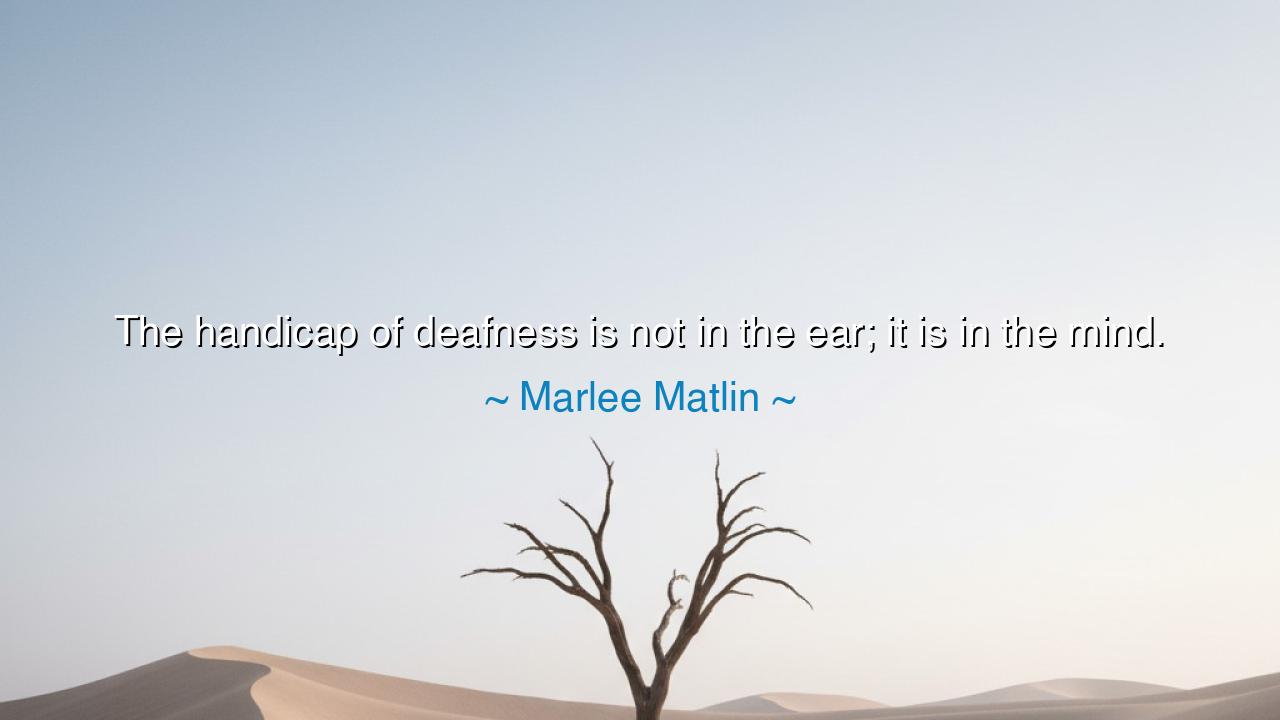
The handicap of deafness is not in the ear; it is in the mind.






O children of the future, gather your hearts and open your minds to the words of Marlee Matlin, a woman whose courage and wisdom speak to the very core of what it means to face the challenges of the world with strength. She says, "The handicap of deafness is not in the ear; it is in the mind." These words, profound and clear, reveal a truth that transcends the surface of perception: that the greatest obstacles we face are not always physical, but mental. It is the mind, the way we perceive and interpret the world, that often creates the greatest barriers.
In the days of the ancients, wise sages understood that the true power of the human spirit lay not in the body, but in the mind and will. The Stoics, like Epictetus, who himself was crippled by the world, taught that freedom comes not from the body’s condition, but from how we choose to respond to it. "It is not what happens to you," Epictetus said, "but how you react to it that matters." So too, Matlin reveals that deafness—or any perceived limitation—is not a condition of the body, but a condition of the mind. The mind can either be a prison or a portal to greatness, depending on how it is shaped by the individual.
Consider the story of Helen Keller, a woman who, like Matlin, faced the challenges of being both deaf and blind, yet who became a symbol of resilience and achievement. Keller could have easily succumbed to the belief that her handicaps defined her, that her inability to see or hear confined her to a life of isolation and limitation. But instead, she listened to the whispers of her soul and the lessons of those who came before her, choosing to cultivate a mind that was limitless. With the help of her teacher Anne Sullivan, Keller found ways to communicate and connect with the world, achieving greatness in writing, activism, and education. Her mind did not view her deafness as a barrier but as a call to discover new ways of engaging with the world.
In the same way, Matlin’s words remind us that it is not the body’s limitations that create true obstacles, but our own perceptions and beliefs about those limitations. A deaf person, or anyone facing a challenge, may encounter struggles, but it is the mind that decides whether those struggles become an insurmountable mountain or a temporary hindrance to overcome. The power of the mind is the power to transform any circumstance, no matter how seemingly insurmountable, into an opportunity for growth. Matlin calls upon all of us to question our assumptions about what is possible, to look beyond the surface of a limitation and recognize the potential that lies within every person.
Let us turn to the story of Thomas Edison, a man who faced many failures, deafness among them. Edison, who struggled to hear the world, could have allowed his hearing loss to become a barrier to his immense contributions to science and innovation. Yet, his mind remained undeterred, driving him to invent the light bulb, the phonograph, and numerous other innovations that changed the course of history. His deafness, far from limiting him, became a source of strength—a way for him to turn his attention inward and focus on his creativity and inventions without distraction. Edison’s legacy shows us that the greatest handicaps can sometimes be the very things that push us toward greatness, depending on how we perceive and embrace them.
The lesson to be learned, O children, is one of immense power: limitations are not defined by the body, but by the mind. It is the mind that chooses to perceive something as an obstacle or an opportunity. It is the mind that chooses to overcome adversity or to be defeated by it. No challenge, no disability, no circumstance, however severe, has the power to define you unless you allow it. Matlin’s wisdom teaches us that it is not the physical or external world that binds us, but the stories we tell ourselves in our hearts and minds.
So, O children, take this to heart: when you face challenges, do not see them as barriers, but as opportunities to shape your mind and spirit. Recognize that deafness, whether physical or metaphorical, can be a pathway to strength if you choose to see it as such. When you encounter struggles in your life, ask yourself: How can I change the way I think about this? How can I find a new path forward? By mastering your mind, you will find that there are no true handicaps—only new ways of seeing, creating, and living. The mind is the true source of freedom, and it is through the mind that all limitations can be transformed into opportunities for growth and empowerment.






AAdministratorAdministrator
Welcome, honored guests. Please leave a comment, we will respond soon